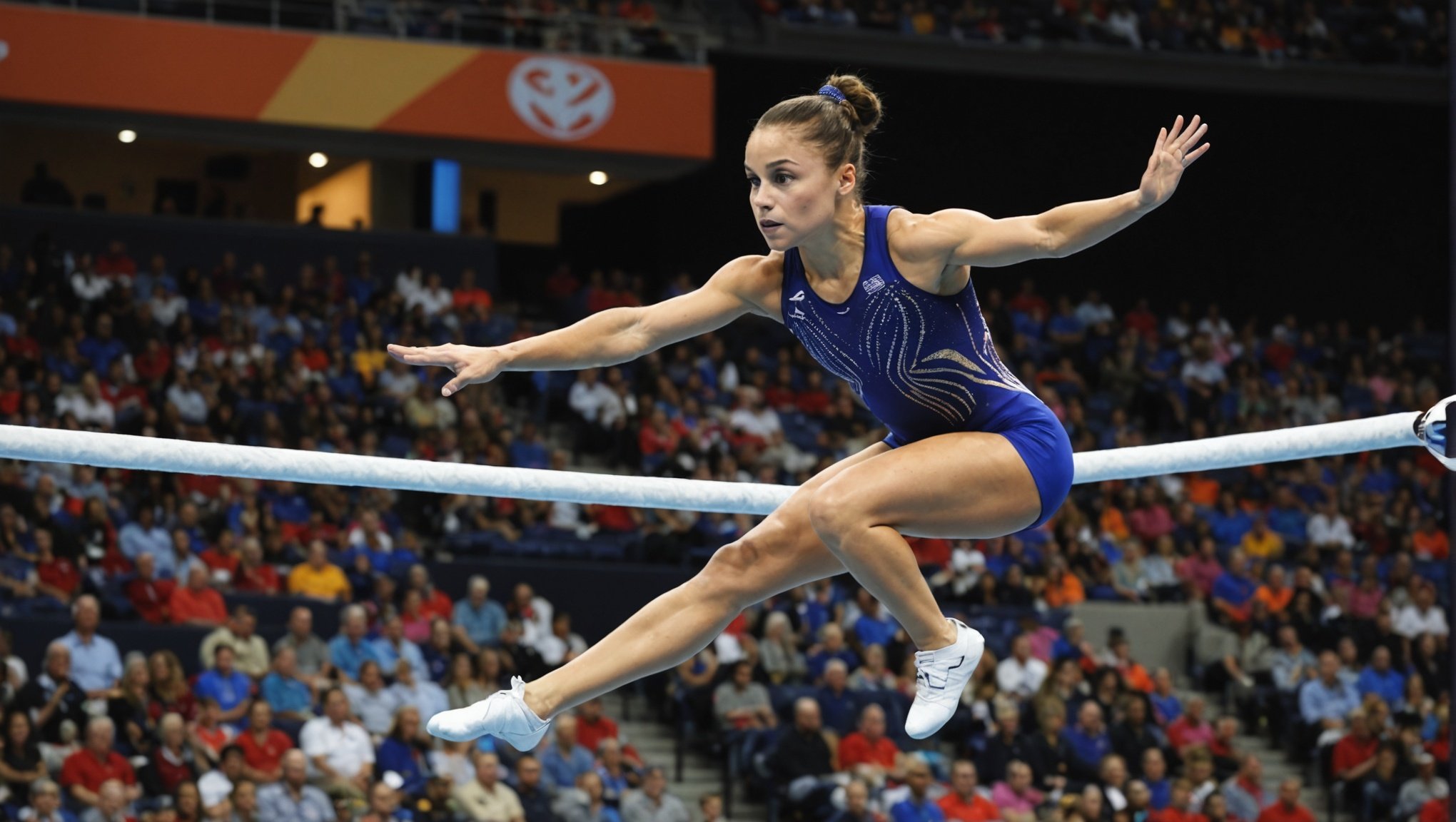Unlocking Peak Performance: How Psychological Strategies Can Alleviate Gymnastics Competition Anxiety
Understanding Competition Anxiety in Gymnastics
Competition anxiety is a pervasive issue in the world of gymnastics, affecting athletes of all levels, from young beginners to elite performers. This anxiety can manifest in various ways, including increased heart rate, sweating, and most critically, negative thoughts that can hinder an athlete’s ability to perform at their best.
Rebecca Smith, a high-performance coach and founder of the #PerformHappy Community, emphasizes the importance of addressing these mental challenges. “Kids need resources to deal with the pressure of competition, but they don’t necessarily want it to be their coach or parents,” she notes. This highlights the need for tailored psychological strategies that athletes can use independently to manage their anxiety[1].
In parallel : How Virtual Fans Transform the Vibe of Empty Sports Arenas
The Role of Mental Training in Sports Performance
Mental training is a crucial component of any athlete’s regimen, particularly in high-stakes sports like gymnastics. It involves a range of techniques designed to enhance mental toughness, resilience, and overall performance.
Mindfulness and Meditation
Mindfulness and meditation are powerful tools that can help athletes stay calm and centered under pressure. Shayamal Jallabhjee, an expert in mental resilience, shares practical tips on how to incorporate mindfulness into daily routines. “Mindfulness helps athletes stay present and focused, reducing the impact of stress and anxiety,” he explains. By practicing mindfulness, athletes can better manage their emotions and maintain a clear mind during competitions[1].
This might interest you : Boosting Team Unity: Innovative Virtual Exercises for Athletes in Remote Training
Visualization Techniques
Visualization is another effective strategy that athletes can use to prepare mentally for competitions. This involves imagining oneself performing successfully, which can boost confidence and reduce anxiety. Joey Hewitt, a mental performance coach, highlights the simplicity and effectiveness of visualization: “These aren’t complex strategies; they are straightforward and can completely shift your confidence and joy in sports”[1].
Benefits of Psychological Strategies for Athletes
The benefits of incorporating psychological strategies into an athlete’s training are multifaceted and far-reaching.
Enhanced Mental Toughness
Mental toughness is the ability to perform at a high level despite adversity. Psychological strategies such as hypnosis, positive self-talk, and emotional regulation can significantly enhance an athlete’s mental toughness. For example, Heath Thorpe, an elite gymnast known for his artistry and athleticism, credits his mental resilience for his ability to push the limits of self-expression in his sport[1].
Improved Physical Performance
There is a strong interplay between mental and physical performance. When athletes are mentally prepared, they perform better physically. This is because mental preparation reduces stress and anxiety, allowing athletes to focus on their physical execution. Dr. Brent Hogarth, a clinical psychologist specializing in ADHD and hyperfocus, notes that “mental skills translate to all areas of life,” including physical activity. By mastering mental skills, athletes can optimize their physical performance[1].
Better Mental Health
Psychological strategies not only help athletes perform better but also contribute to their overall mental health. By learning to manage stress and negative thoughts, athletes can maintain a healthier mental state. This is particularly important for young athletes who are under significant pressure to perform. Rebecca Smith underscores the importance of mental health: “When kids learn skills to cope with stress & emotion in a sport context, they become better prepared to thrive in school and beyond”[1].
Practical Techniques for Managing Competition Anxiety
Here are some practical techniques that athletes can use to manage competition anxiety:
-
Deep Breathing Exercises: Deep breathing can help calm the nervous system and reduce anxiety.
-
Inhale deeply through the nose for 4 seconds.
-
Hold the breath for 4 seconds.
-
Exhale slowly through the mouth for 4 seconds.
-
Repeat this cycle several times.
-
Positive Self-Talk: Encourage positive self-talk to counter negative thoughts.
-
Use affirmations such as “I am prepared,” “I am strong,” or “I can do this.”
-
Repeat these affirmations regularly, especially before competitions.
-
Visualization: Visualize successful performances to boost confidence.
-
Imagine yourself performing flawlessly.
-
Visualize the crowd cheering and your team supporting you.
-
See yourself overcoming challenges and achieving your goals.
-
Mindfulness Meditation: Practice mindfulness meditation to stay present and focused.
-
Use guided meditation apps or videos.
-
Focus on your breath or a mantra to stay present.
-
Practice mindfulness regularly to build mental resilience.
Table: Comparing Psychological Strategies for Athletes
| Strategy | Description | Benefits |
|---|---|---|
| Mindfulness | Focus on the present moment to reduce stress and anxiety. | Enhances mental resilience, reduces negative thoughts. |
| Visualization | Imagine successful performances to boost confidence. | Improves mental toughness, enhances physical performance. |
| Positive Self-Talk | Use affirmations to counter negative thoughts. | Boosts confidence, reduces anxiety. |
| Deep Breathing | Calm the nervous system through controlled breathing. | Reduces immediate anxiety, improves focus. |
| Hypnosis | Use guided hypnosis to enter a state of deep relaxation and focus. | Enhances mental toughness, improves sleep quality. |
The Impact of Social Identity on Athlete Mental Health
An athlete’s social identity, including their relationships with teammates, coaches, and family, plays a significant role in their mental health and performance.
Team Support
A supportive team environment can significantly alleviate competition anxiety. When athletes feel supported by their teammates, they are more likely to perform at their best. Rebecca Smith emphasizes the importance of team support: “Performing well is a blend of hard work, skill, and mental toughness. When athletes feel supported, they are more likely to achieve peak performance”[1].
Coach-Athlete Relationship
The relationship between an athlete and their coach is crucial. Coaches who provide positive reinforcement and support can help athletes manage their anxiety. Shayamal Jallabhjee notes that “coaches who understand the mental aspects of the sport can provide valuable support to their athletes, helping them stay calm and balanced under pressure”[1].
Real-Life Examples and Anecdotes
Heath Thorpe’s Journey
Heath Thorpe, an elite gymnast from Australia, is a prime example of how mental resilience can lead to peak performance. Despite the high-stakes environment of men’s elite gymnastics, Thorpe has managed to stand out not only for his athleticism but also for his artistry and individuality. His journey is one of resilience and authenticity, showing a new generation of athletes what it means to be true to oneself even in the most competitive settings[1].
Joey Hewitt’s Transformation
Joey Hewitt, a mental performance coach, transformed his own athletic career through simple yet effective mental skills. From being a barely-making-varsity high school basketball player to becoming a professional athlete, Hewitt’s story underscores the power of mental training. His approach is practical and straightforward, making it accessible to athletes of all levels[1].
Unlocking peak performance in gymnastics requires a holistic approach that includes both physical and mental training. By incorporating psychological strategies such as mindfulness, visualization, and positive self-talk, athletes can significantly alleviate competition anxiety and enhance their overall performance.
Rebecca Smith’s work with the #PerformHappy Community and her podcast episodes with experts like Heath Thorpe, Dr. Brent Hogarth, and Shayamal Jallabhjee provide valuable insights and practical tips for athletes, coaches, and parents. These strategies not only help athletes perform better but also contribute to their mental health and well-being.
In the words of Rebecca Smith, “When kids learn skills to cope with stress & emotion in a sport context, they become better prepared to thrive in school and beyond.” By embracing these psychological strategies, athletes can achieve peak performance while maintaining a healthy and balanced life.










